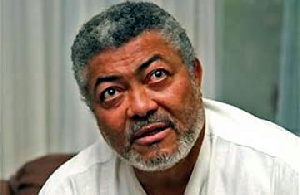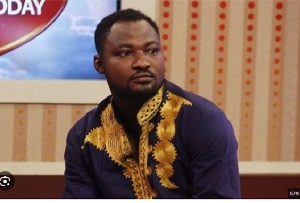General News of Wednesday, 23 July 2014
Source: DAYBREAK
Rawlings was for his time - Sylvester Mensah
Chief Executive of the National Health Insurance Authority (NHIA) Sylvester Mensah has described former president Jerry Rawlings as a “product of his time” when asked if the later was justified for killing three of Ghana's past leaders on grounds of effecting change.
Mr. Mensah, in a rather sly answer to the straight question, noted: “Jerry Rawlings was very much a product of his time, which you describe as ‘Ghana’s troubled past and revolution.’ Harsh as the events were, it is important to recognise that we all contributed to the turmoil of those times in our own ways! We need to learn the lessons of those days as we make strides into our new democratic future, and vow never again to allow things to degenerate to those levels. We must also ensure that the lessons of those times are thoroughly taught to future generations. That is the only way to protect our fledgling progress and avoid mistakes of the past.”
The NHIA Boss made the statement in an interview he granted California-based International journalist, Ambrose Ehirim.
The interview, apparently meant to be on Mr. Mensah’s autobiography, “In the Shadows of Politics – Reflections from my Mirror", strayed into other somewhat controversial areas including his thoughts on Jerry Rawlings, President John Mahama’s performance after becoming president, Kofi Abrefa Busia, Ghana’s prospects for growth as well Sylvester Mensah’s late diplomat father who was sent by Kwame Nkrumah on a dare-devil mission to smuggle a letter to Patrice Lumumba while under house arrest.
DAYBREAK reproduces portions of the interview:
Question: On Ghana's troubled past and revolution, was Jerry Rawlings justified for killing three of Ghana's past leaders on grounds of effecting change?
Answer: Jerry Rawlings was very much a product of his time, which you describe as ‘Ghana’s troubled past and revolution.’ Harsh as the events were, it is important to recognise that we all contributed to the turmoil of those times in our own ways! We need to learn the lessons of those days as we make strides into our new democratic future, and vow never again to allow things to degenerate to those levels. We must also ensure that the lessons of those times are thoroughly taught to future generations. That is the only way to protect our fledgling progress and avoid mistakes of the past.
Question: How about Kofi Busia, what justified his removal by the military juntas?
Answer: This is substantially no different from the previous question, in that they both involve mistakes of the past. Only as we learn the lessons of such mistakes can we avoid repeating them as we head confidently into our future.
Question: And, Osagyefo Dr. Kwame Nkrumah. What explains his removal by the Emmanuel Kotoka-led military juntas?
Answer: Dr. Kwame Nkrumah’s removal from office and subsequent humiliation by his political opponents was engineered and facilitated by western powers who felt threatened by the brilliance of his vision and what they saw as its inherent threat to their colonial/neo-colonial interests. This is well documented in the literature. But again, we have lessons to learn from that episode, at all levels, and pass them on to the younger generations. That’s the deeper benefit of his far-reaching personal sacrifice for the sake of his people.
Question: When you came back from London and had wanted to get back on your feet by way of appropriate consultation with the influential, what was your view and what went through your mind when Kofi Awoonor said you "had come rather too late"?
Answer: As I observe in chapter 13 of my book, every party in a democratic dispensation has ‘internal stakeholders’ or ‘interest groups’ whose view must be reckoned with in the affairs of the party. It is the height of naivety to desire to make headway in a political party in a democracy and choose to overlook this cardinal point. This explains my reason for consulting those many regarded as the shakers and movers of my party when I came back from England.
Professor Kofi Awoonor’s view was a disappointment at the time. But I took it as a candid opinion expressed by a respectable man who always spoke his mind. Therefore, I chose to regard his opinion as an unspoken hint [from someone I respected] to double my effort if I really wanted to win. However, the eventual winner of the elections [Mr. Johnson Asiedu-Nketia] has proved to be a real asset to the party as General Secretary, and this I acknowledge with humility. Upon hindsight, perhaps l should have given him my support rather than contesting him.
Question: Ghanaians I have talked to said that President John Dramani Mahama isn't their best deal. What's your take on that?
Answer: As a journalist of your caliber and experience, I am sure you are well aware that political assessments can often be subjective and tend to be coloured by people’s political preferences, perceptions and prejudices. Therefore, to be on safer grounds, one would want to turn to published data by reputable sources on governance when making judgments about performance in office. I am sure you have your own trusted sources you consult for information. I recommend highly that you turn to your sources on this subject in order to come to a more reliable and a more rounded view of the performance of John Dramani Mahama.
You may discover, for example, that among all Ghana’s presidents since 1957 when we gained independence, he was confronted with one of the most difficult set of circumstances including a lengthy legal challenge to his legitimacy by an opposition party after a fairly conducted general election. This undoubtedly had implications for political stability and investor confidence in the Ghanaian economy.
This coupled with low and falling commodity prices in an economy with high-growth potential and development expectation may generate varying perceptions depending on one’s political persuasion and expectations. I dare say he has done a sterling job of grappling with those difficult circumstances within just over a year of taking charge and is now on the verge of turning things around. If doing that is not a serious deal for government in the twenty-first century, I’d like to know what is!











